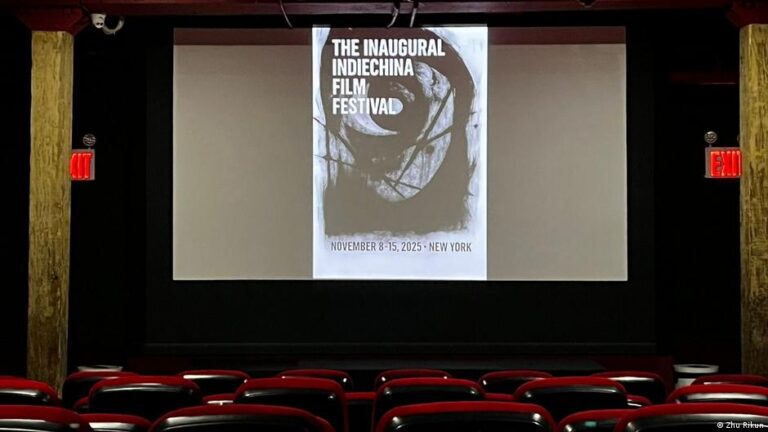Photos of empty cinemas have been circulating online in recent weeks — a form of protest staged by Zhu Rikun, curator of the New York–based IndieChina Film Festival, against what he called the Chinese government’s crackdown on independent films.
The festival was canceled on November 6, just days before it was due to start, due to pressure from the Chinese government.
“I didn’t notice any warning signs… In the festival statement, I even expressed hope that the festival could soon return to China. I didn’t want it to become an event in exile,” Zhu told DW.
He recounted that the pressure began with a call from his father who urged him “not to do anything harmful to the country.” Soon after, almost all Chinese filmmakers withdrew their films and foreign guests faced harassment from unidentified individuals.
Back in China, the Wuhan Berlin Film Week also unexpectedly announced its cancelation, prompting speculation it, too, had faced pressure from authorities.
International human rights groups warned of Beijing’s growing repression both internally and abroad.
The move “demonstrates the Chinese government’s aim to control what the world sees and learns about China,” said Yalkun Uluyol, a China researcher at Human Rights Watch, in a press release.
Why would China target an independent festival in the US?
Beijing has not issued any official comment regarding the cancelation in New York.
Certain films in the festival lineup, such as the 2019 Hong Kong pro-democracy documentary “If We Burn,” could be seen by the Chinese government as controversial. However, most participating works did not touch on politics, yet their directors and collaborators still faced pressure.
Talking to DW, Zhu expressed anger and surprise that the event fell through, adding that the reasons may be personal.
“It’s probably because of me. I may be the kind of person who cannot organize this type of event.”
In the eyes of Chinese authorities, Zhu’s previous works may be problematic — he had curated screenings of a famous Chinese dissident artist Ai Weiwei, and also directed a documentary about himself, showing how police questioned him in a hotel.
Indie filmmakers see their space shrink in China
Independent film festivals in China have faced intensifying crackdowns over the past decade, according to Human Rights Watch.
In 2011, the Documentary Film Festival China (DOChina), one of the country’s most important independent film events, was canceled due to official pressure.
In the following years, China’s three major independent film festivals across the country were raided or shut down. The crackdown intensified in 2014 when police raided the Beijing Independent Film Festival, seizing film collections and detaining organizers.
Movies to support ‘national unity’
China’s Film Industry Promotion Law declares that filmmakers must avoid producing content that could “harm national unity” or state interests. All films must be submitted for government review. Unlicensed works cannot be shown publicly, shared online, or submitted to festivals.
It was this pushback that eventually forced Zhu to give up organizing festivals in China and move to the United States.
“Over the past decade, I’ve seen both politically and commercially themed independent films in China being suppressed… Independent film in China is nearly extinct,” he told DW.
Chinese independent festivals try to fly under the radar
The Wuhan film festival, which was also abruptly canceled this year, was run by a local, non-official independent screening group and had reached its fourth edition.
Two young Chinese film organizers, speaking to DW under pseudonyms for safety reasons, pointed to the unpredictability of government oversight as a key reason for the sudden shutdown.
Y, a former volunteer with a grassroots screening group, said independent festivals in China often survive only because local authorities “turn a blind eye” to them.
“Why this edition was shut down but the previous one wasn’t… you tend to look for reasons in yourself,” one said.
C, another Chinese film curator, also told DW that the strength of state enforcement fluctuates when it comes to independent film screenings, with some recent events facing little interference.
Despite the recent setbacks to his New York event, Zhu remains relatively optimistic. He told DW that Beijing’s latest crackdown has actually garnered support for the festival.
“To some extent, we’ve gained a degree of space… Many people want to know what happened behind all this, which forces the authorities to acknowledge it rather than act with complete impunity,” he said.
Edited by: Darko Janjevic
Authors of this article include Yuchen Li and Yu-Chun Chou


